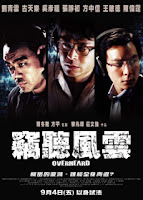"Accomplishments"
At home: Finally sat down to watch Canada's comedy darling, Schitt's Creek, and got halfway through in just a couple days. These are my thoughts after three seasons... What a wonderful juggling act. As this is essentially a modern-day Green Acres, it points and laughs at the privileged top 1%, completely out of touch with the every day life they are forced to live after their business manager steals all their money. But we're also empathizing with them (when the town mayor is the king of obnoxious, Chris Elliott, you tend to do that), and whether because they are forced into close quarters and inhabitual sacrifice, they really do care for each other and for the townspeople they interact with. The Creek has immense heart. Now, we expect Eugene Levy and Catherine O'Hara to shine, but everyone in the cast brings something to the table, I would say especially co-creator and co-writer DAN Levy, who is the MVP of the show even on the acting side (also watch for Sarah Levy as cafe owner Twyla - a real family show), and who seems to always be on this side of corpsing opposite his fellow actors. My other gold star goes to Karen Robinson in a small role as a dry, no-nonsense city counselor - so funny! After three seasons, the story's been allowed to move forward, keeping things fresh. Love it! We'll talk again when I finish it.
Shirley Jackson wrote The Lottery, a short story everyone read in high school, and lots more besides, so why don't I know anything about her? I'm gonna take a guess and say she was a female writer who struggled with severe anxiety AND often wrote "genre" stories, and that's probably what kept her off my university curricula. We live in a different time, and certainly, The Haunting of Hill House has created increased interest in her work and life, celebrated (after a fashion) in Shirley, starring Elizabeth Moss, tracking her writing of Hangsaman, a novel about a "lost girl" based on a real person, but also commutatively, also both Shirley and the wife of a young teacher roped into the role of nursemaid in the household for a time. By helping this witty but often cruel woman, she essentially becomes a shade of her, just as her young husband is in the process of becoming Jackson's own notoriously unfaithful husband. Great performances all around (especially Moss and as her almost sinister husband, Michael Stuhlbarg), and a Gothic feel that's right out of Jackson's own dark imagination. Its greatest asset is that it makes you want to read the work; you can't say that about every writer's "biopic".
There are two Robert Kleins in 1976's Mr. Klein. One is Alain Delon, Parisian art broker in Nazi-occupied France. The other is a mystery man, possibly Jewish, possibly in the Resistance, possibly many things. There might be half a dozen Robert Kleins, which is part of the play on identity. When the authorities start to think the two Kleins are one and the same, Delon's fears for his life, but more than anything, wants to solve the mystery. And the more he digs, the more correspondences one can draw between the two men, to the point of yourself wondering if they ARE the same person after all. Kafka (in particular The Trial) is an obvious evocation, but I was also reminded of Philip Roth's 1993 novel Operation Shylock. A taut thriller with a lot of unease, the movie jumps right in with a horrific scene from anti-Semitic history that has nothing directly to do with the main plot, but is solely designed to make you feel anxious. The confusion of identities universalizes the targeting of Jews (with Delon looking nothing like the caricatures used by Nazis) - fascism just needs a scapegoat, any will do - and should make the audience apprehensive about the lead. Yes, there's an injustice being perpetrated here, but will his quest to clear himself of "Judaic ancestry" sell another man out to the Nazis? Is it, indeed, the act of an informant? A lot of questions, and don't expect them all to be answered, that isn't the point.
After giving us the superlative Infernal Affairs, Alan Mak and Felix Chong bring us the Overheard triptych (I'd use that word rather than "trilogy" in this case), focusing on police surveillance and wire-tapping and how such technology can be corruptive. Several cops in the same unit, investigating insider trading, are compromised by their mindset and personal pressures. Some temptations are petty (the jealous husband), some you will more readily accept (hospital bills), but the film is ruthless about the consequences of its characters' actions, and its third act feels like a break from the proceduralism used in most of the film. Not that it is ever a very strict procedural, given the amount of time given over to soap opera. Still, these moments are needed so that we care about these characters and understand why they're doing what they're doing, as well as give us a break from the heady techno stuff and insider trading financial babble. I think I got some of it, but just took for granted that the bad guys were doing bad stuff with numbers. Your mileage may vary, but it's not always directly explained, and that may be trying for some. But great performances and and immersive atmosphere make the pill go down smoothly.







Comments